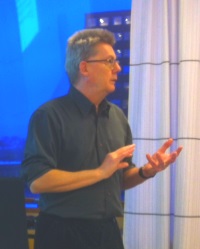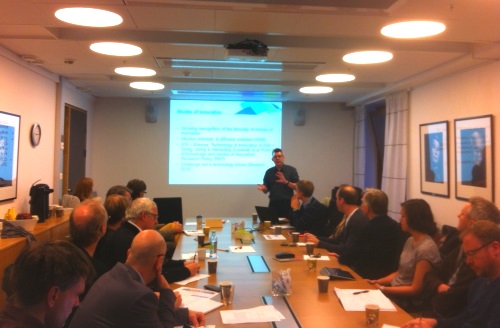In the third seminar of the seminar series 'The Energy Revolution' (Norwegian), the Centre for Technology, Innovation and Culture welcomed Fred Steward, professor of innovation and sustainability at the Policy Studies Institute at the University of Westminster. Steward spoke about the green transition in the context of cities.
 Fred Steward
Fred Steward
A shift in focus
Currently, 'everyone' talks about the need for a transition to a low carbon economy, but it was really only about a decade ago - ushered in by the Stern review in 2006 - that this position came to be a part of the mainstream discourse.
According to Steward, managing such a transition is a monumental policy challenge - one that requires new thinking on innovation policy. "Most innovation policy and practice remain focused on singular technologies", said Steward. "'System innovations' however, involve different technologies, a variety of social and behavioural innovations, and a diversity of societal actors. We need a shift in focus from producers and technologies to consumers and use, we need to pay attention to new social actors, and we need to engage with new knowledge practices."
We are under great time pressure to reduce greenhouse gas emissions.
Cities as learning arenas
This involves looking at place based actors, i.e. the institutions and organizations whose key responsibilities include transport, housing, waste and energy systems, as well as knowledge that is more practice based than conventional academic science (learning by doing). Steward referred to the most recent IPCC report on mitigation of climate change, which for the first time includes a specific chapter on human settlements, infrastructure and spatial planning. Yet the experts of the report are still cautious about cities' overall contribution to the challenge of climate change and remain focused on technology driven sectors such as electricity production.
Cities are neglected spaces where things can happen.
"Of course, new technologies have to be developed", stated Steward. "But we are under great time pressure to reduce greenhouse gas emissions, and in the short-term, it is more effective to make current systems more efficient. This view is underrepresented. Cities are neglected spaces where things can happen, we need to focus more on that. Cities provide us with learning arenas where we may move on from aspirations to transformative action."
 Foto: Allan Dahl-Andersen, UiO
Foto: Allan Dahl-Andersen, UiO
Transition Cities
Steward spoke about his involvement in the Climate-KIC Transition Cities project. Climate-KIC is one of three Knowledge and Innovation Communities (KICs) created in 2010 by the European Institute of Innovation and Technology (EIT), whose mission is to create sustainable growth by addressing climate change mitigation and adaptation. The Transition Cities project looked at the cities of Birmingham, Frankfurt, Wroclaw, Budapest, Bologna/Modena, and Castellon/Valencia, and took the form of a partnership between city authorities and transition researchers. Cities were asked to identify all current (active in the period 2012-2013) low carbon innovation projects addressing buildings, transport, and energy networks. The project identified 110 projects valued at over €2 billion.
The researchers used social network analysis software to map out the pattern of social actors and low carbon innovation projects in a particular city. By organizing the projects and the actors into such cluster maps, inter-linkages and the role of different actors in the process of change became clear, which in itself gives important information to policy makers, but which should also enable comparison between the cities and with leading global models of successful system transition. The focus of the Transition Cities project is to address how the existing portfolio of innovation projects can be strategically managed in a more effective way to promote low carbon transitions in citywide systems.